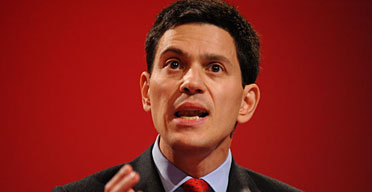Milibland.
 It's hardly been a great week for speeches at the Labour conference, and yesterday's effort by David Miliband, the foreign secretary, was completely dismal. Unlike Brown, who does attempt to weave something of a narrative and talks in a way that makes grammatical sense, Miliband is from the Blair school of verb-less sentences, endless apparent rhetorical questions and dramatic, overly long pauses. Blair though at least usually had something of interest to say, whether you agreed with it or wished to be in the same room so that you could throttle him; Miliband, urged by ultra-Blairites to run against Brown as potential leader, simply didn't have either the message or the power of rhetoric to get more than a stifled yawn.
It's hardly been a great week for speeches at the Labour conference, and yesterday's effort by David Miliband, the foreign secretary, was completely dismal. Unlike Brown, who does attempt to weave something of a narrative and talks in a way that makes grammatical sense, Miliband is from the Blair school of verb-less sentences, endless apparent rhetorical questions and dramatic, overly long pauses. Blair though at least usually had something of interest to say, whether you agreed with it or wished to be in the same room so that you could throttle him; Miliband, urged by ultra-Blairites to run against Brown as potential leader, simply didn't have either the message or the power of rhetoric to get more than a stifled yawn.Strange then that it managed to at least somewhat excite the leader writers on the Grauniad. They headed their piece, Not yet a doctrine, but a vision, but it wasn't even that. It was rather an extended collection of statements of the bleeding obvious, with nothing whatsoever to tie them all together. He might have admitted that the Iraq war was divisive, and that there were rights and wrongs over it, but the word mistake, either connected to the decision to join the United States' in the initial invasion or the innumerable disasters that have occurred since the beginning of the occupation never so much as passed his lips. There was no mention of when we might finally be getting out of Iraq; that was instead left to Des Browne, who hinted that we might be able to fully hand over security responsibility to the Iraqis in Basra shortly.
While he predictably angered the Sun by sticking by the decision not to hold a referendum on the EU reform treaty, his other main point about the union was that Turkey should be admitted as soon as possible, which is hardly a new policy, as welcome as it is. His positioning over military action, that victory does not mean a solution isn't even the message coming from the Americans any longer, let alone from our own generals who have for a while based their own pronouncements in realism rather than in the fantasy world previously inhabited by Blair and the hopeless Margaret Beckett. Iran only gets mentioned as part of his optimistic/pipe dream section, saying that ten years' down the line it might be a democratic paradise helping in the war against terror, which ignores not just that Iran is hell of a lot more democratic than another of our great allies, Saudi Arabia, but also that Iran did just that when it helped with the overthrow of the Taliban, only for it become to the new enemy regardless of any previous cooperation.
He ends the speech with a flourish, remarking that the "second wave" of Labour foreign policy is all about "progress" and to "[make] more people better educated, better fed, better off, better able to make their own history", but without convincing how he's going to achieve any of that. Pessimism for the moment remains the dominant emotion.
Labels: David Miliband, foreign policy, Labour conference

